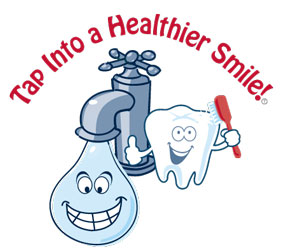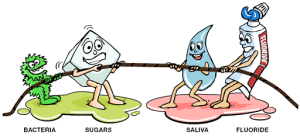
The use of fluoride can prove beneficial for both children and adults. Twenty years ago, dentists thought
that fluoride worked mainly by strengthening developing teeth before they entered the mouth. As a result,young children were the main focus of fluoridation efforts. Now, research has shown that fluoride
applied to the teeth, using toothpastes, mouth rinses and fluoride treatments, is just as important for all
teeth in fighting decay. The regular use of fluoride helps to protect the permanent teeth from decay and
sensitivity, allowing patients to keep their permanent teeth much longer. Here at Plymouth Valley Dental Group,
we recommend all our patients have fluoride applied twice a year.
How Does Fluoride Work:
- It reduces the solubility of enamel in the presence of acid.
- It exerts an effect on bacterial plaque by reducing their ability to produce acid.
- It promotes remineralization of tooth enamel.

Applying topical fluoride directly to the erupted teeth allows the penetration of fluoride into the enamel
and exposed dentin. It provides localized protection of teeth not treated with ingested fluoride and
replaces fluoride leaching out of the tooth surface. Topical fluorides include toothpastes, mouth rinses,
and professionally applied fluoride solutions and gels.
Statistics:
A 1998 study by the U.S. Department of Health and Human Services has shown a dramatic increase in
tooth loss among adults age 35-44. The study shows that 78% of adults 35-44 have at least one tooth lost
because of tooth decay. 84.7% over the age of 18 have at least one area of tooth decay per year. Data
from the 1988-1991 National Health and Nutrition Examination Survey showed that 6.9% of 18-24 adults
and 56% of all adults over the age of 75 have root decay. As we age, there is a decreased salivary flow,
exposed root surfaces, and poorer home care. This greatly increases our risk for root decay.
Higher Risk Adults:
Although everyone should use fluoride, some adults are at higher risk of decay and may need more
intensive supplementation. To find out if you might be one of them, consider these questions:
- If you are taking medications that cause dry mouth or have a disease that causes dry
mouth. Without saliva to neutralize the acids in your mouth and wash away food
particles, you’re more susceptible to tooth decay.
- If your gums have receded or pulled away from the teeth. This gives bacteria more
room to roam and hastens tooth decay.
- If you wear braces. Braces and other orthodontic appliances trap a lot of bacteria that
can lead to cavities.
- If you’ve had radiation therapy to the neck or head. Radiation damages the salivary
glands, causing dry mouth.
If you answered yes to any of these questions, our office fluoride varnish would aid in protecting the
teeth, but it is also recommended to include in your home oralcare with a high fluoride toothpaste, such as
Prevident5000 or Fluordex.